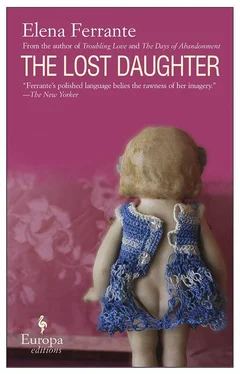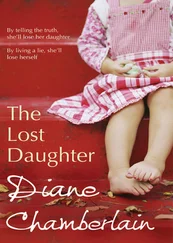Maybe Nina realized it, too, or simply couldn’t stand it anymore. In a suddenly coarse dialect she hissed, Stop it, and resettled her daughter in her arms with a violent jerk, Stop it, I don’t want to hear you anymore, do you understand, I don’t want to hear you anymore, that’s enough of your demands, and she pulled the child’s dress down hard in front, over her knees, in a sharp gesture that she would have liked to aim at her body, not her clothes. Then, confused, she returned to Italian with an expression of self-reproach, and said to me in a forced way:
“Excuse me, I don’t know what to do, she’s torturing me. Her father’s gone and now she’s taking it out on me.”
Then, with a sigh, Rosaria took the child from her arms: come to auntie, she murmured, with emotion. This time Elena, incongruously, put up no resistance; she yielded immediately, throwing her arms around her aunt’s neck. Out of spite for her mother, or out of certainty that this other body—without a child but expecting one, children love the not yet born a lot, the newborn little, or very little—was at this moment welcoming, would hug her between large breasts, having set her on that stomach, like a seat, protecting her against the possible anger of the bad mother, who didn’t know how to take care of her doll, who in fact had lost her. She entrusted herself to Rosaria with a vehement exaggeration of affection, to imply treacherously: Auntie is better than you, Mama, Auntie is kinder; if you go on treating me this way, I’ll stay with her forever and won’t want you anymore.
“There, go on, so I can have a little rest,” Nina said with a frown of disappointment; her upper lip showed a veil of sweat. Then to me: “Sometimes you just can’t cope anymore.”
“I know,” I said, to indicate that I was on her side.
But Rosaria intervened, and, hugging the child, she murmured: they put us through so much, and she planted noisy kisses on Elena, murmuring repeatedly, in a voice consumed by tenderness: pretty girl, pretty pretty girl. Already she wanted to enter the circle of us mothers. She thought that she had waited too long, but that by now she had learned the part completely. In fact she had decided to show immediately, especially to me, that she could soothe Elena better than her sister-in-law. So, here, she set her down on the ground, be a good girl, let Mama and Signora Leda see how good you are. And the child said nothing; she stood beside her sucking her thumb in desperation, while Rosaria asked me, with an air of satisfaction: what were your daughters like as children, were they like this little treasure? I felt a strong impulse to confuse her, to punish her, throw her off balance.
“I remember very little, nothing really.”
“That can’t be—you don’t forget anything about your children.”
I was silent for a moment, then said calmly:
“I left. I abandoned them when the older was six and the younger four.”
“What do you mean, who did they grow up with?”
“With their father.”
“And you didn’t see them again?”
“Three years later I took them back.”
“What a terrible thing, why.”
I shook my head, I didn’t know why.
“I was very tired,” I said.
Then I turned to Nina, who now looked at me as if she had never seen me: “Sometimes you have to escape in order not to die.”
I smiled at her, I gestured toward Elena:
“Don’t buy her anything—forget it, it won’t help. She’ll find the doll. Goodbye.”
I nodded at Rosaria’s husband, who seemed to me to have assumed his unpleasant mask, and left the store.
Now I was really angry with myself. I never spoke of that period of my life, not even to my sisters, not even to myself. The times I had tried to mention it to Bianca and Marta, together or separately, they had listened to me in distracted silence, had said they remembered nothing, had immediately gone on to speak of something else. Only my former husband, before going to work in Canada, had occasionally begun his remonstrances and resentments from that point; but he was an intelligent and sensitive man, ashamed of his meanness, and he quickly moved on, without insisting. All the more reason, then, to wonder why I had confessed what was so much my own to strangers, people very different from me, who would therefore never be able to understand my reasons, and who surely, at that moment, were speaking ill of me. I couldn’t bear it, I couldn’t forgive myself, I felt I had been flushed out.
I wandered around the square trying to calm down, but the echo of the words I had uttered, Rosaria’s expression and her reproaches, the flash of Nina’s pupils prevented me, in fact intensified a constricted anger. Useless to say it wasn’t important, who were those two women, when would I ever see them again after this vacation. I realized that if that judgment could help me bring perspective to Rosaria it was of no use with Nina. Her gaze had pulled back abruptly, but without losing me: it had only retreated, as if seeking a distant point, in the depths of her pupils, from which to look at me without risk. That urgent need for distance had wounded me.
I walked indifferently among the venders of all sorts of goods, and meanwhile I pictured her the way I had occasionally seen her in those days, watching from behind as with slow, precise movements she spread lotion on her young legs, her arms, her shoulders, and finally her back, tensely twisting around as far as she could get, so that I had had the desire to get up and say here, I’ll do it, let me help you, as, when I was a girl, I had thought of doing with my mother, or as I had done often with my daughters. Suddenly I realized that, day after day, without intending to, I had involved her, from a distance, with alternating and often conflicting feelings, in something that I couldn’t decipher, but that was intensely my own. For this reason, too, perhaps, I was now furious. I had instinctively used against Rosaria an obscure moment of my life and had done it to astonish her, even in a certain sense to frighten her; she was a woman who seemed to me disagreeable, treacherous. But in reality I would have liked to speak of these very things with Nina alone, on a different occasion—cautiously, in order to be understood.
Soon it started raining again and I had to take shelter in the building that housed the market, amid sharp odors of fish, basil, oregano, peppers. There, jostled by adults and children who arrived hurrying, laughing, wet from the rain, I began to feel sick. The odors of the market nauseated me, the place seemed increasingly close, I was blazing hot, sweating, and the breeze that came in waves from the outside chilled the sweat, causing moments of vertigo. I gained a spot at the entrance, hemmed in by people watching the water cascade down and children screaming, joyfully frightened by the lightning and the thunder that followed. I settled myself almost on the threshold, so that I would feel only the cool air, and tried to get my nerves under control.
What had I done that was so terrible, in the end. Years earlier, I had been a girl who felt lost, this was true. All the hopes of youth seemed to have been destroyed, I seemed to be falling backward toward my mother, my grandmother, the chain of mute or angry women I came from. Missed opportunities. Ambition was still burning, fed by a young body, by an imagination full of plans, but I felt that my creative passion was cut off more and more thoroughly by the reality of dealings with the universities and the need to exploit opportunities for a possible career. I seemed to be imprisoned in my own head, without the chance to test myself, and I was frustrated.
There had been small alarming episodes, not normal impulses of depression, not a destructiveness expressed symbolically, but something more. Now these events have no before and after, they return to my mind in an order that is always different. One winter afternoon, for example, I was studying in the kitchen; I had been working for months on an essay that, although short, I couldn’t manage to finish. Nothing fit together, hypotheses were multiplying in my head, I was afraid that the professor who had encouraged me to write it wouldn’t help me publish it, would reject it.
Читать дальше












